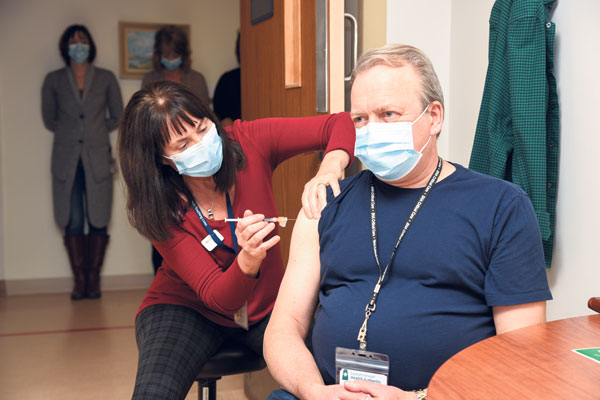
A second COVID-19 has been approved for use in Canada.
Moderna’s vaccine, which uses a similar method to the Pfizer BioNTech mRNA vaccine, was approved by Health Canada on Wednesday. Canada’s first shipment of the vaccine is expected before the end of the calendar year.
The mRNA vaccines are like a set of instructions that teach your body to make a protein similar to the one on the exterior of the virus. Your immune system then learns how to identify, and fight, that protein, so that if it does come into contact with it again (in the form of the virus itself), it already knows how to destroy it, preventing the virus from taking hold and spreading.
A humorous, expletive-filled, jargon-free breakdown of how the virus works was tweeted by Saskatoon psychiatrist Dr. Madhav Sarda while he was waiting for patients and went viral:
Unlike Pfizer’s vaccine, though, which requires storage at the ultra-cold temperature of -70 C, the Moderna vaccine only requires temperature of -20 C, which allow storage in a standard commercial freezer. The warmer storage temperature means the vaccine can be distributed in remote and isolated communities as it requires no special equipment to distribute.
Saskatchewan anticipates it will receive 4,900 doses in the last week of December.
“The approval of the Moderna vaccine means more high-risk Saskatchewan residents will be able to be immunized against COVID-19,” Health Minister Paul Merriman said.
“This vaccine allows us to continue with our Phase 1 plans to target residents where they are living and working, whether in long term care and personal care homes, in northern and remote communities and in health care staff outside our major centres.”
Moderna vaccinations will target long term care and personal care home residents and staff; front-line health care workers most at risk for COVID-19 exposure; residents 80 years and older; and all residents 50 years and older living in northern and remote communities, as supply allows.
“Today’s authorization is a critical step in ensuring additional COVID-19 vaccines are available to all Canadians in all parts of the country,” the federal government said in a statement.
“The different storage and handling requirements of the Moderna COVID-19 vaccine mean that it can be distributed to isolated and remote communities, including the territories.”

